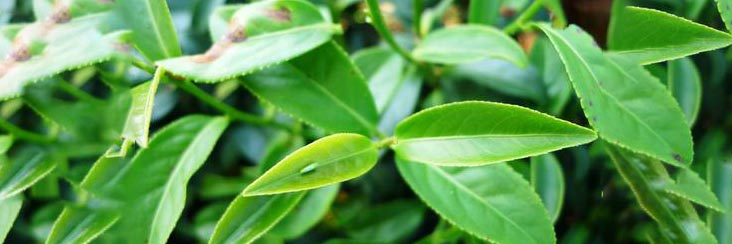
Tea Story #1: Shan Lin Xi High Mountain Concubine Oolong Tea, Winter 2011
An elusive type of tea that varies with each batch made, from season to season – depending on the presence of a small insect. Concubine Oolong is the result of the leaves being bitten by a tiny fly during growing season. This causes a kind of "scarring" of the leaf which results in partial oxidation while the leaf is still growing. It also instigates an immune system response in the plant, resulting in a unique flavor. Normally, this bug is deterred by the regulated use of a water soluble pesticide sprayed on the plants early in the growing season. More and more, farmers are allowing their plants to go unsprayed at least one season in the year. Typically this is done in summer, the most prolific season for the insect that is responsible for the production of Concubine tea.
Produced in Northern Taiwan, a more common name for "bug bitten" tea is Oriental Beauty (Dong Fang Mei Ren - also called Bai Hao Oolong or Peng Feng Cha). Oriental Beauty is made from a slightly different green heart oolong varietal than that which is cultivated for high mountain tea in Central Taiwan. Concubine also differs from Oriental Beauty in that the Concubine leaves are tightly rolled in the manner of a modern Taiwan Oolong, rather than the traditional mainland China method of curled, open leaves. Tightly rolling the leaves is a Taiwanese innovation that protects and preserves the tea.
Our tea mentors happened upon this batch of tea while tasting a farmer friend’s Shan Lin Xi high mountain spring tea. The farmer mentioned in passing that he had a batch of tea from the winter prior’s harvest that had been affected by this bug due to an oversight in not spraying a small section of his self-run farm. It is very rare to find winter tea produced in this fashion from a high elevation farm.
It is a relatively small farm, managed by a husband and wife team who transformed their plot of virgin high mountain bamboo forest into a tea garden just ten years ago. Currently in its prime age, the tea garden is at about 1,600 meters elevation in one of the largest and most popular regions of Taiwan for producing top quality high mountain oolong tea. This couple manages their farm by themselves, using only natural fertilizers, zero weed killers, and only a minimal amount of water soluble pesticides early in the growing season. They produce approximately 300 pounds of tea from a typical day's spring harvest, compared to 1000 pounds a day from larger productions in the area.



